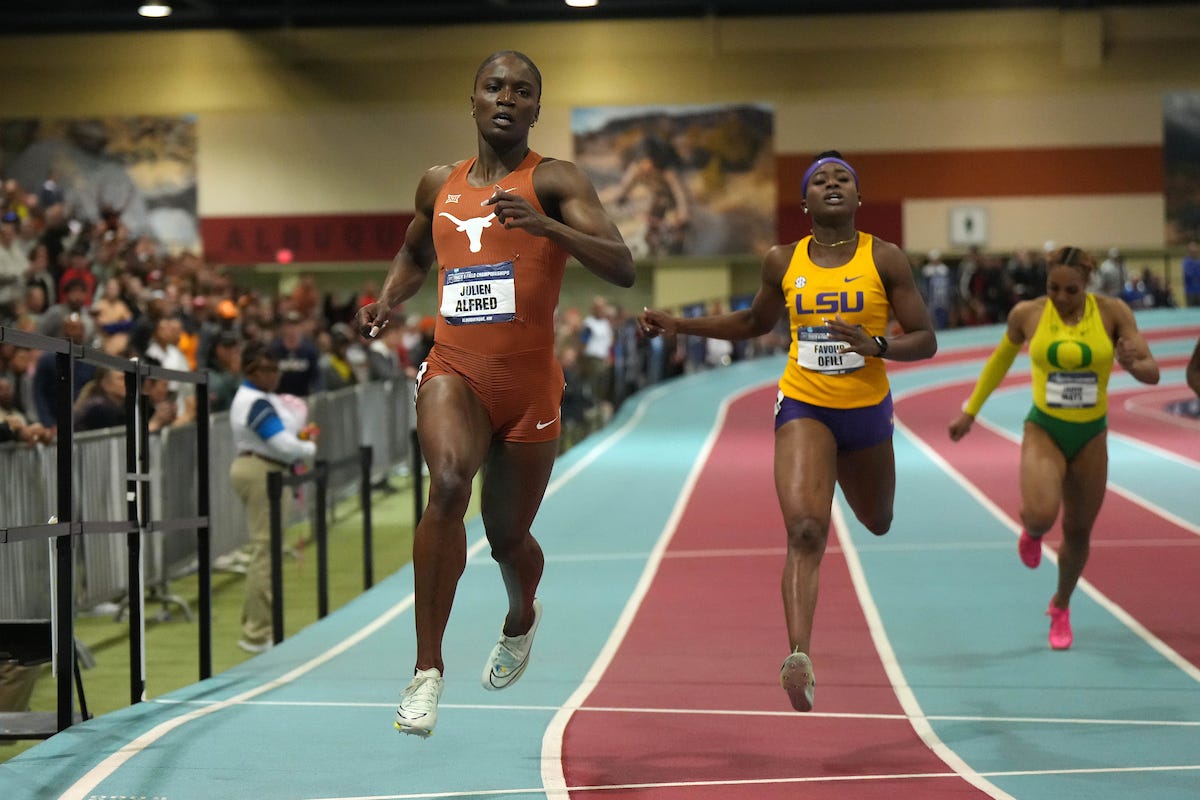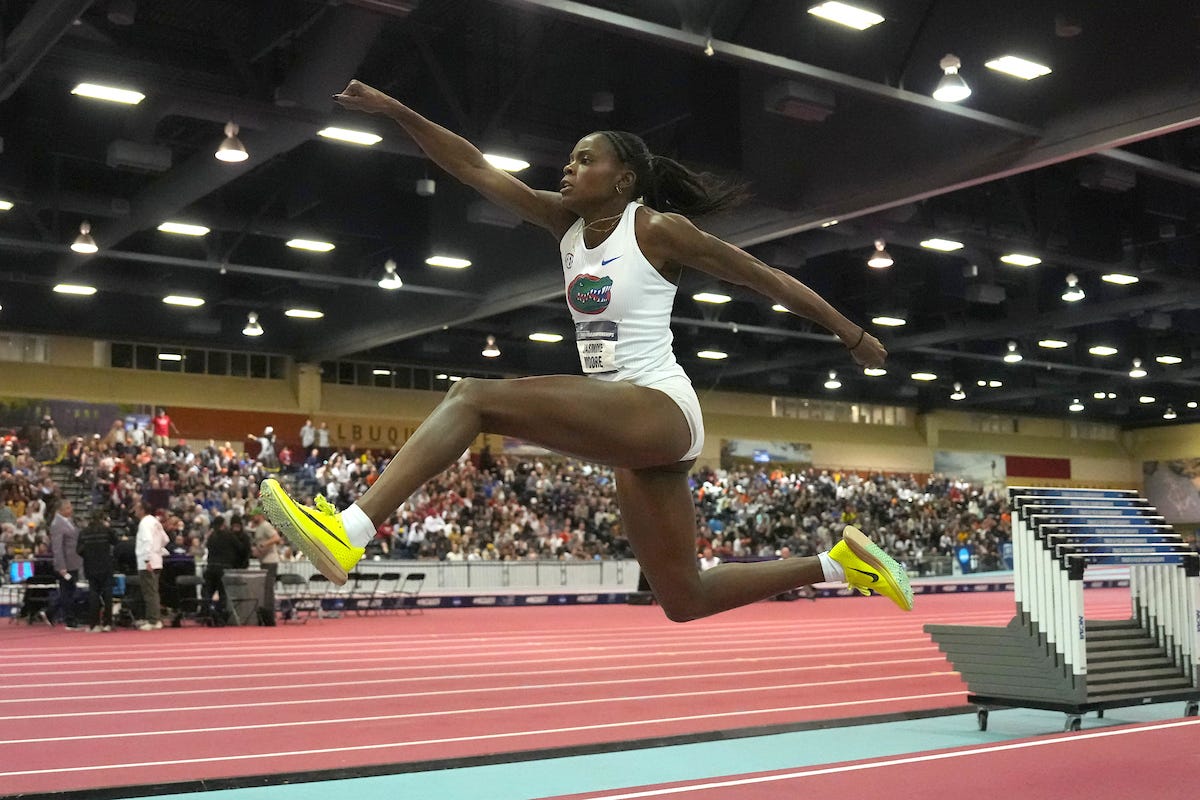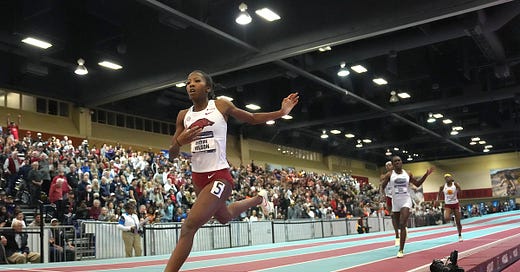Arkansas wins title on record day
Wilson has hands in two collegiate records for Razorbacks as seven college bests set in women's meet

If you want to gain a true appreciation for the brilliance that was displayed during the women’s competition of the NCAA Indoor Track and Field Championships at the Albuquerque Convention Center in Albuquerque, New Mexico, consider the following fact.
Sprinter Julien Alfred of the University of Texas set three collegiate records over the two-day meet which concluded on Saturday with Arkansas winning its third team title in the last four meets. However, she was outdone in the collegiate record department by Jasmine Moore of Florida, who racked up four collegiate bests during the meet, including three in the triple jump on Saturday.
Ackera Nugent of Arkansas, who set a collegiate record of 7.72 seconds in the women’s 60-meter hurdles in the semifinals on Friday before winning the final in 7.73 on Saturday, might have summed up the collective mindset of so many of the performers in the meet when she told John Anderson of ESPN+, “I’m the type of person that I’m a championship runner. So when it comes down to the last bit of time, I’m gonna perform.”
There is no doubt that the elevation of Albuquerque — which at nearly 5,000 feet aids performances in the sprints, hurdles and jumps — contributed to the collegiate record onslaught. But the NCAA track and field championship meets, whether indoor or outdoor, annually produce performances that leave you shaking your head in amazement.
This year’s addition just had more head shaking, or at least more vigorous shaking, than usual. Consider that 10 collegiate records were set during the women’s competition, including seven on Saturday that ended with Britton Wilson of Arkansas running a 49.20-second anchor leg on a Razorback quartet whose winning time of 3 minutes 21.75 seconds annihilated the previous collegiate record of 3:24.09 that another Wilson-anchored Arkansas squad had run last year.
Wilson, a junior, played a key role in Arkansas totaling 64 points to defeat runner-up and pre-meet favorite Texas (60) and third-place and defending champion Florida (45) for the team title.
Lance Harter, who is in his final year of a 33-year run as the women’s cross country and track and field coach at Arkansas, told trackside reporter Anderson that a determination to compete as a team, and not just as individuals, contributed to Arkansas’s title in a meet in which more than one prognosticator had the Razorbacks finishing third behind Texas and Florida.
“I think this [title] is the result of that where each and every one of our athletes rose to a level that no one expected except themselves.”
Wilson was a prime example of that.
The defending NCAA champion in the 400-meter hurdles outdoors had only run one 400-meter race during the indoor season prior to the NCAA meet as she had competed in three 800s, as well as a 600 in which she set a collegiate record of 1:25.16 in her season-opening race.
She lowered her indoor best in the 400 to 50.69 in a semifinal on Friday and then unloaded a stunning 49.48 American-record clocking in the final on Saturday that was the second fastest time in history and left her well ahead of second-place Rashidat Adeleke of Texas (50.45) and third-place Talitha Diggs of Florida (50.49). Adeleke (50.33) and Diggs (50.15) had each lowered the collegiate record during their respective conference championship meets two weeks earlier, but after Adeleke won the first of two sections of the 400 on Saturday, Wilson lined up against Diggs, Arkansas teammate Rosey Effiong, and Jan’Taijah Jones of USC in the second final.
Diggs took it out from the start and clocked 23.17 — to Wilson’s 23.56 — for the first 200-meter lap, but Wilson cut into Diggs’ lead down the backstretch before passing her entering the second curve and never looking back.
Wilson’s time, which was just .22 seconds off the 49.26 world record that Femke Bol of the Netherlands set on Feb. 19, crushed Diggs’ previous U.S. record and was noticeably quicker than Wilson’s outdoor best of 50.05.
“I just wanted to execute and be smart,” Wilson told Anderson. “[Diggs is] a really strong runner and she likes to get out. Just having her in the race is really good competition and pushes me to be my best too.”

Arkansas’ title was the result of scoring a substantial amount of points in a handful of events.
After a victory by junior Amanda Fassold in the pole vault and a second-place finish in the distance-medley relay on Friday gave Arkansas 18 points, the Razorbacks totaled 46 points on Saturday in the meet in which the top eight finishers in each event were awarded points on a 10-8-6-5-4-3-2-1 basis.
Arkansas senior Lauren Gregory got the ball rolling when she finished second in the mile in 4:34.24 after Illinois junior Olivia Howell (4:34.00) kicked past her in the final 20 meters of the race.
The Razorbacks then scored 18 points in the 400 as juniors Effiong and Amber Anning finished fourth (50.54 personal best) and sixth (51.22) in addition to Wilson’s victory.
Next up was a victory by Nugent in the 60 hurdles in which her 7.73 clocking edged Kentucky senior Masai Russell, whose 7.75 time equalled her personal best that had been the collegiate record before the start of the meet.
Then came the 3:21.79 runaway victory in the 1,600 relay as Anning ran 51.47 seconds on the first leg, sophomore Joanne Reid clocked 50.52 on the second, and Effiong split 50.57 on the third carry before Wilson anchored in 49.20.
The time is the fastest ever run indoors, but because Reid is from Jamaica and Anning is from Great Britain, it is a world best, not a world record. The rules stipulate that world records can only be set in relays when every team member is from the same country.
It’s fair to say Texas underperformed as a team during the meet, but Alfred was absolutely sensational.
After lowering her collegiate record in the 60-meter dash to 6.96 in her semifinal on Friday, the senior from St. Lucia won the final in 6.94 on Saturday before running a collegiate record of 22.01 in the 200, and clocking 51.76 on the third leg of the Longhorns’ 1,600 relay team that finished second in 3:25.67.
Alfred got off to one of her typically great starts in the 60 before powering away from the field and finishing a whopping .14 seconds ahead of Georgia freshman Kaila Jackson (7.08) in second.
The 6.94 effort was her fifth collegiate record of the season in the event and moved her into a tie for second on the all-time list with Alia Hobbs, who had produced her mark on the same track at the USA Track & Field Indoor Championships three weeks earlier.
Then came the 200, an event that Alfred openly disdains.
Running in lane six, one lane outside of LSU junior Favour Ofili, Alfred got off to a great start. Ofili appeared to be reeling her in midway through the second curve, but Alfred really went to her arms coming off the curve and drew away from Ofili in the home straightaway.
Her time of 22.01 gave her a large margin of victory over Ofili, who finished in 20.20, and crushed the collegiate record of 22.09 that Kentucky’s Abby Steiner had set last year. It was also the second fastest time in history behind the 21.87 world record that was set by Merlene Ottey of Jamaica in 1993.
Despite the record, Alfred reiterated to Anderson after the race that she “hated” the 200 as he interviewed her while she sat on the track, breathing heavily.
“It hurts so much,” she said. “I’m still sitting here on the ground and I can’t get up. Here’s why I hate it.”
When asked about her time, she said “I was not expecting that. I’m sure my coach was, but not me.”

While Alfred had been in the limelight for much of the season because of her record-breaking performances, Moore had quietly gone about her business as the defending NCAA champion in long jump and triple jump at both the indoor and outdoor levels. But she got a lot of people’s attention on Friday when she set a collegiate record of 7.03 (23 feet 0¾ inch) in the long jump, and then came her performance in the triple jump on Saturday.
On her first attempt, she bounded 14.74 (48-4½) to crush her previous collegiate record of 14.57 (47-9¾) from last year and also bettered the American record of 14.64 (48-0½) set by Torri Franklin in the same facility in 2020.
She then unloaded a 15.08 (49-5¾) effort in round two that was the best in the world this year and moved her into a tie for fifth on the all-time performer list.
After bounding 14.82 (48-7½) on her third attempt, fouling her fourth, and hitting 14.86 (48-9) on her fifth, she produced a 15.12 (49-7¼) effort on her final jump to take over sole possession of fifth place on the all-time list.
Her 15.08 and 15.12 jumps were also farther than the U.S. outdoor record of 14.92 (48-11½) set by Keturah Orji in 2021.
Moore’s jumping was so dynamic that it completely overshadowed a Bahamian record of 14.88 (48-10) by Tennessee senior Charisma Taylor in second place and a third-place effort of 14.29 (46-10¾) that moved freshman Ackelia Smith of Texas to third on the all-time Jamaican list.
The triple jump was the most depth-laden event of the women’s meet as the top six finishers jumped more than 14 meters (45-11¼). In addition, 14 of the 16 jumpers in the competition recorded personal bests.
Katelyn Tuohy of North Carolina State, Lamara Distin of Texas A&M, Adelaide Aquilla of Ohio State, and Roisin Willis of Stanford also won events on Saturday.
Tuohy, a sophomore who had won the 5,000 in 16:09.65 on Friday, took the 3,000 in 9:10.07 after moving into the lead with four laps left in the race. Notre Dame junior Olivia Markezich finished second in 9:13.01 as Tuohy won her fourth NCAA title in the last 10 months. She placed first in the 5,000 in the NCAA outdoor meet last June and won the NCAA cross country championships in November.
Distin, a senior, won her second consecutive title in the high jump by clearing 1.91 (6-3¼). She also won the high jump at the outdoor championships last year.
Aquilla, a senior, was an upset winner in the shot put as her 19.28 (63-3¼) winning mark topped her season best of 17.89 (58-8½) by more than four feet. Sophomore Alexina Johansson of Nebraska finished second at 19.12 (62-8¾).
Aquilla had set a collegiate record of 19.64 (64-5¼) in winning her second consecutive outdoor title last year, but she had struggled indoors until Saturday.
Defending champion Jorinde van Klinken of Oregon, who set a collegiate indoor record of 19.57 (64-2½) earlier this year, finished sixth at 17.77 (58-8¾).
Willis and fellow Stanford freshman Juliette Whittaker placed first and second in the 800 with times of 1:59.93 and 2:00.05. LSU sophomore Michaela Rose finished third in 2:00.85 after she led the field through 400 meters in 58.96 and 600 in 1:28.58.
Willis and Whittaker moved to second and third on the all-time collegiate performer list with their performances.
The 2024 NCAA Indoor Track and Field Championships will be held at the TRACK at new balance at Boston Landing in Brighton, Massachusetts on March 8-9.




